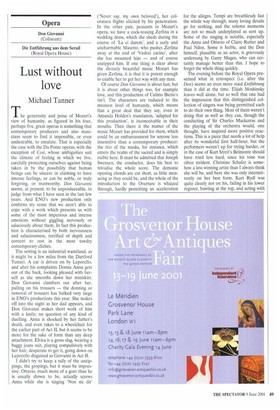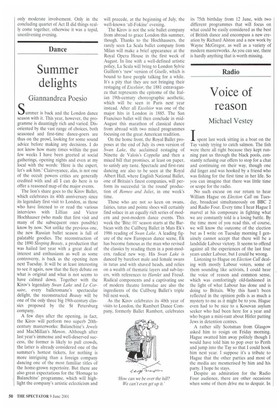Lust without love
Don Giovanni (Coliseum) Die Entftihrung aus dem Serail (Royal Opera House)
Michael Tanner
The generosity and poise of Mozart's view of humanity, as figured in his four, perhaps five, great operas is something that contemporary producers and also musicians seem to find it impossible, or even undesirable, to emulate. That is especially the case with the Da Ponte operas, with the exception of Cosi, whose ambiguities suit the climate of feeling in which we live, carefully protecting ourselves against being taken in by the possibility that human beings can be sincere in claiming to have intense feelings, or can be noble, or truly forgiving, or trustworthy. Don Giovanni seems, at present, to be unproduceable, to judge from what I have seen in the last few years. And ENO's new production only confirms my sense that we aren't able to cope with a work which presents us with some of the most imperious and intense emotions without giggling nervously or salaciously about them. In fact this production is characterised by both nervousness and salaciousness, terrified of depth and content to rest in the most tawdry contemporary clichés.
The setting is an industrial wasteland, as it might be a few miles from the Dartford Tunnel. A car is driven on by Leporello, and after his complaints Donna Anna gets out of the back, looking pleased with herself as she smooths down her miniskirt. Don Giovanni clambers out after her, pulling on his trousers — the donning or removal of trousers has bulked very large in ENO's productions this year. She makes off into the night as her dad appears, and Don Giovanni makes short work of him with a knife; no question of any kind of duelling. Anna is shocked by her father's death, and even takes to a wheelchair for the earlier part of Act II, but it seems to be more for the sake of form than any deep attachment. Elvira is a gross slag, wearing a baggy jeans suit, playing compulsively with her hair, desperate to get it, going down on Leporello disguised as Giovanni in Act II.
I didn't try to keep a tally of the unzippings, the gropings, but it must be impressive. Ottavio, much more of a goer than he is usually shown to be, actually screws Anna while she is singing `Non mi dir' (Never say, my own beloved'), her coloratura flights elicited by his penetration. In the other pair, peasants in Mozart's opera, we have a cock-teasing Zerlina in a wedding dress, which she sheds during the course of `La ci darem', and a surly and uncharmable Masetto, who pushes Zerlina away at the end of `Vedrai carino', after she has mounted him — and of course unzipped him. If one thing is clear about the divinely beautiful music Mozart has given Zerlina, it is that it is potent enough to enable her to get her way with any man.
Of course Don Giovanni is about lust, but it is about other things too, for example love, and this production of Calixto Bieito's isn't. The characters are reduced to the meanest level of humanity, which means that a great deal that they say, even in Amanda Holden's translation, 'adapted for this production', is inconceivable in their mouths. Then there is the matter of the music Mozart has provided for them, which could be an embarrassment for anyone less insensitive than a contemporary producer: the trio of the masks, for instance, which enters the realm of the sacred and is simply risible here. It must be admitted that Joseph Swensen, the conductor, does his best to trivialise the whole score. The demonic opening chords are cut short, as little menacing as they could be, and the whole of the introduction to the Overture is whizzed through, hardly permitting an acceleration
for the allegro. Tempi are breathlessly fast the whole way through, many loving details go for nothing, and the solemn moments are not so much underplayed as sent up. Some of the singing is notable, especially the Anna and Ottavio of Claire Rutter and Paul Nilort. Some is feeble, and the Don himself, plausible as an actor, is grievously undersung by Garry Magee, who can certainly manage better than this. I hope to forget the whole thing quickly.
The evening before the Royal Opera presented what in retrospect (i.e. after the Don) seems an even more staid Entfiihrung than it did at the time. Elijah Moshinsky leaves well alone, but so well that one had the impression that this distinguished collection of singers was being permitted each to do their own thing. Most of them weren't doing that as well as they can, though the conducting of Sir Charles Mackerras and the playing of the orchestra would, one thought, have inspired more positive reactions. This is a piece that needs a lot of help after its wonderful first half-hour, but the performers weren't up for trying harder, or in the case of Kurt Streit's Belmonte should have tried less hard, since his tone was often strident. Christine Schafer is somehow a less winning artist than I always think she will be, and here she was only intermittently on her best form. Kurt Rydl was quite clearly not on his, failing in his lower register, bawling at the top, and acting with
only moderate involvement. Only in the concluding quartet of Act II did things really come together, otherwise it was a tepid, unenlivening evening.



































































 Previous page
Previous page